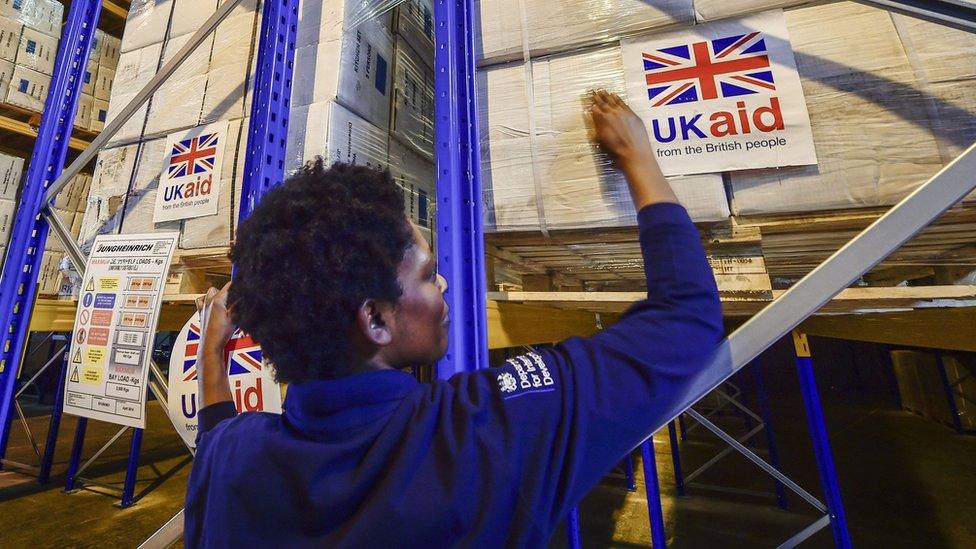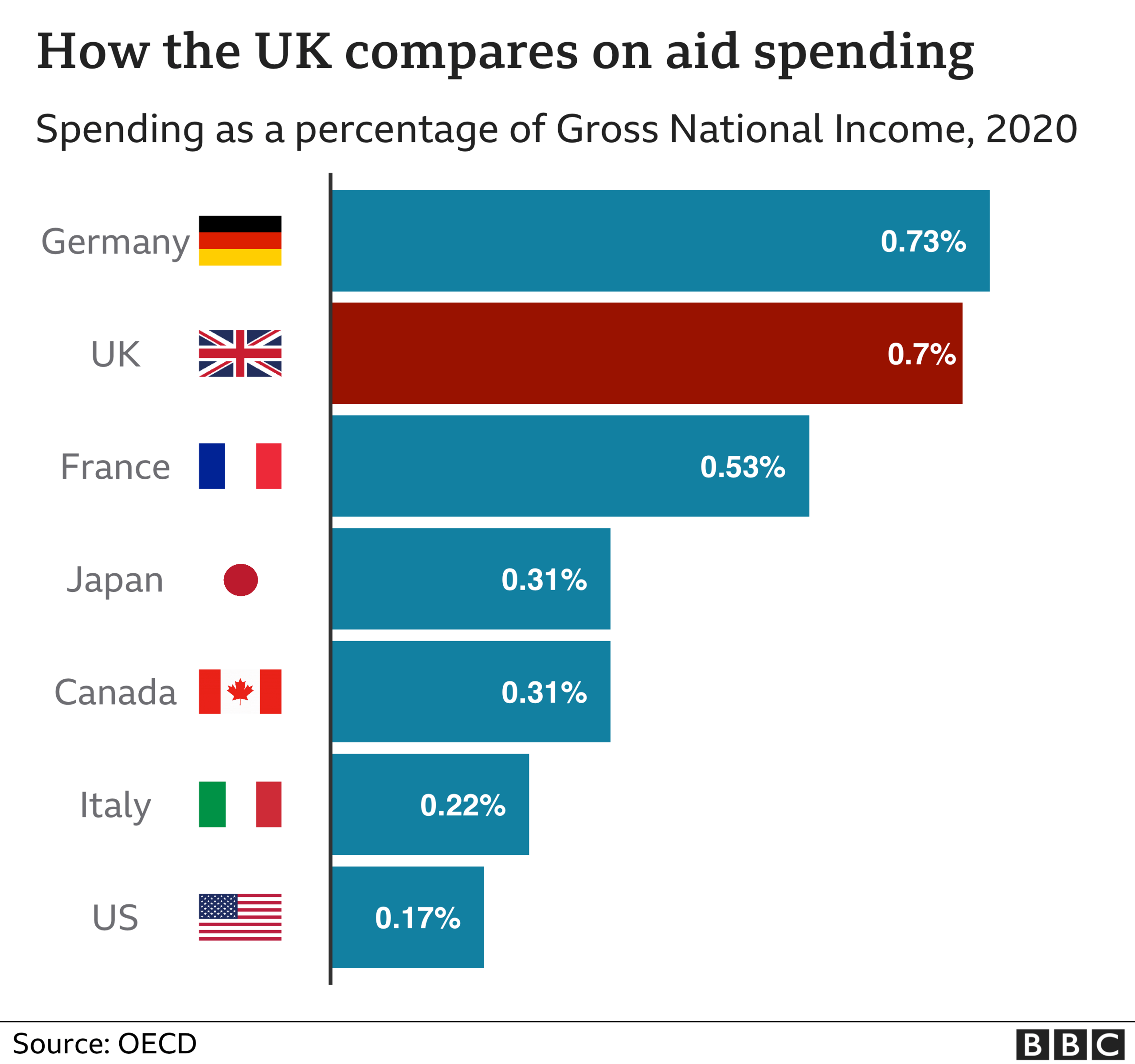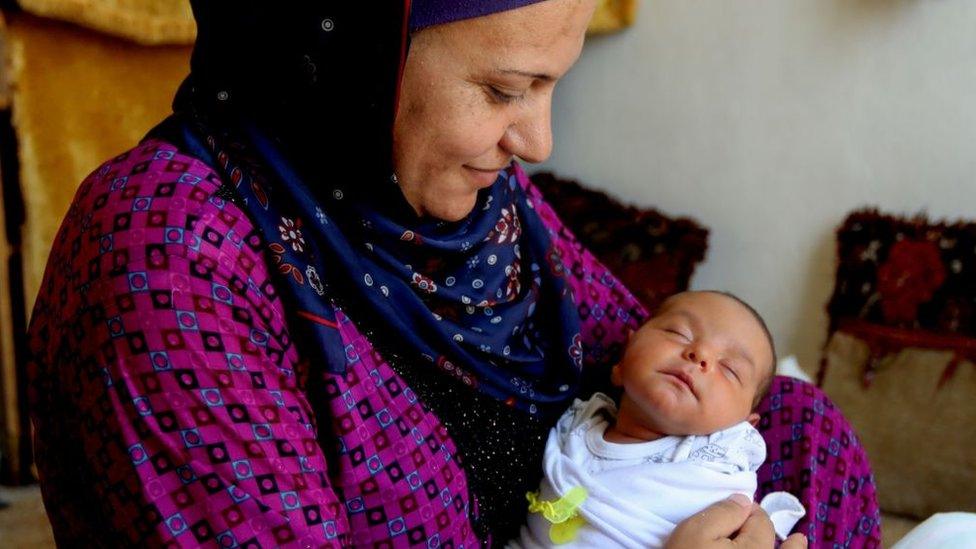Government allows MPs to vote on cut to foreign aid
- Published

MPs will be able to vote on the government's cut to the foreign aid budget on Tuesday.
While many want to reverse the cut, the government is proposing to link any future increase in aid spending to a fall in public debt.
It wants the independent Office for Budget Responsibility to signal if the country can spend more on aid.
The aid budget was cut from 0.7% of national income to 0.5% in response to increased spending in the pandemic.
Meeting the 0.7% figure was made law in 2015, and it is an internationally recognised target.
The government has been under pressure to hold a vote amid cross-party opposition to the cut.
If it loses Tuesday's vote, it says spending will revert to 0.7% next year.
Chancellor Rishi Sunak said the government had made clear the cuts were a "temporary measure", made necessary by the government providing "over £400bn of total support for the economy since the start of the pandemic".
In a written statement, he said the government had borrowed nearly £300bn in 2020, equivalent to 14.3% of GDP.
And he said the government committed to returning to the 0.7% figure when the OBR's forecast showed "that, on a sustainable basis, we are not borrowing for day-to-day spending and underlying debt is falling".

Announcing the vote in the Commons on Monday, Leader of the House Jacob Rees-Mogg said: "It will be a yes or no answer. Does this House wish to see the public finances kept under reasonable control? Does it recognise there are limits to what we can do?
"Or on the other hand, do we want to hard press our hard-pressed taxpayers even further? That will be the question for the debate tomorrow."


The government has long promised to restore aid spending to its previous levels "when fiscal conditions allow".
Now it has spelt out in more detail what that means: the government's finances have to be in surplus for a sustainable period of time and underlying debt has to be falling as a percentage of national output.
The question is whether MPs will accept this.
Treasury sources speculate the two new tests could mean aid spending returns to the target of 0.7 per cent of national income in, say, a couple of years when the economy bounces back from its pandemic downturn.
They say this is a "fair and reasonable compromise" that meets the concerns of MPs who wanted a vote.
And they say they are "cautiously confident" of winning the vote as a result.
But others at Westminster say the Treasury's new tests are broadly drawn and could be hard to meet.
They think the tests could lock in the £4bn aid cut not just for the parliament but for many years to come.
They also note the vote will be on a political commitment by the government, not a legally binding change to legislation.
So that is the question before MPs tomorrow: defeat the government and aid spending increases to 0.7 percent of national income from next year, or support the government and ensure that any aid increase in future is dependent on debt and borrowing falling, and not just national income rising.
The result of the vote will, of course, be politically significant at Westminster.
But it will also be materially significant for millions of people round the world who benefit from UK aid.

On Saturday, a group of philanthropists, including the Bill and Melinda Gates Foundation, said they would provide £93.5m emergency funding to cover some UK aid cuts.
They said the temporary funding would help save "critical projects" and ensure progress was not "wasted".
The government has previously described the decision to cut aid as "tough but necessary".
The cuts, which are thought to amount to around £4bn, have been criticised by leading charities such as Oxfam and ActionAid, which warned that they have already forced projects to be cancelled.
Many Tory MPs have also spoken out against the move, which went against the party's election manifesto pledge to stick to the 0.7% figure.
Conservative MP Tom Tugendhat, chairman of the Commons Foreign Affairs Committee, said: "When Britain withdraws, others step in. By cutting our aid, we have given states such as China and Russia an opportunity to expand their influence at Britain's expense."
- Published11 July 2021

- Published23 June 2021
